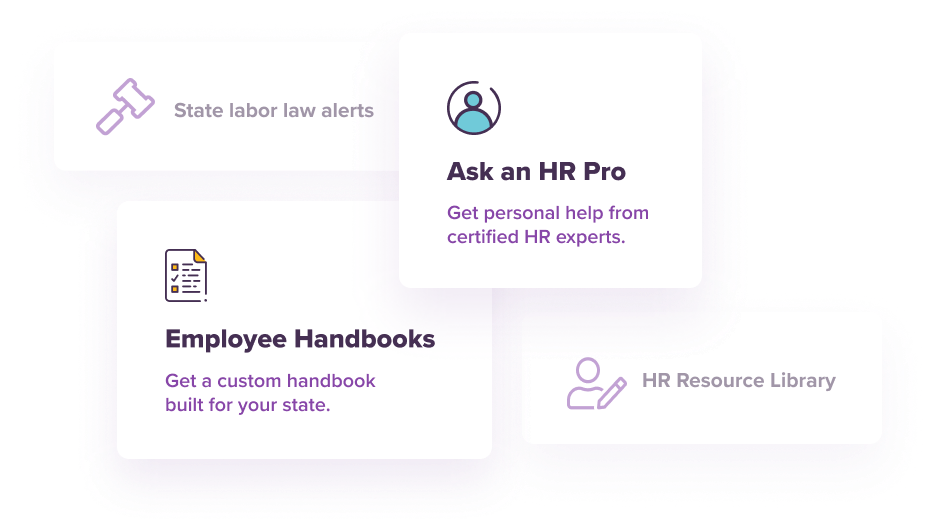Top 5 things to keep in mind about employee rights and standards
Small business owners often have to do a lot of hands-on, in-the-moment learning. And with a growing business, employee rights compliance isn’t always at the forefront of their minds. But when it comes to employee rights, it’s better not to learn the hard way. Stay ahead of compliance challenges and legal repercussions by keeping these things in mind.
Keep accurate records
When you hire a new employee to work for your business, you probably have them read and sign the standard new hire paperwork like an employment contract or tax documents. But it’s also important for small business owners to keep accurate records of employee hours, pay rates, paid time off, workplace incidents, and employee disputes.
Because your responsibilities don’t end with reporting to the IRS. You also need records that show you’re staying compliant with the Department of Labor’s Fair Labor Standards Act (FLSA), the Occupational Safety and Health Administration (OSHA), and the Equal Employment Opportunity Commission (EEOC). And it’s important to remember that your employees can report you to any regulatory agency if they spot any workplace violations.
Know your overtime laws and stay ahead of overtime hours
Overtime hours can be confusing for new business owners. Some business owners may stay far away from overtime hours for fear of violating FLSA regulations, whereas others may schedule their employees to work overtime hours without even realizing it.
Here’s what to know about overtime:
- Federal regulations require you to pay non-exempt employees overtime when they’ve worked more than 40 hours in a week.
- Federal law requires employers to pay non-exempt employees one and a half times their regular wage for overtime hours.
- If you pay your employees hourly wages, they are likely not exempt from overtime pay.
- While federal law doesn’t prohibit mandatory overtime hours, some states put a limit on how many overtime hours employees can work.
The bottom line: Know your federal and state laws and keep good overtime records so you don’t overpay or underpay your employees.
Provide regular training to employees and managers
Training your employees and managers is essential for staying compliant with regulatory agencies like OSHA and the EEOC. But by making your employees aware of their rights, you also empower them and turn your small business into an ideal place to work.
You should train your employees on:
- Paid break rights
- Their rights regarding their wages and overtime hours
- Your sick leave, vacation policies, or paid time off policies
- Workplace safety and equipment handling, if applicable
You should also provide ongoing training on:
- How to spot discrimination
- How to spot unfair treatment
- How to deal with or report workplace incidents or disputes
Review your policies and procedures regularly
As demonstrated by a whole slew of California labor law updates, laws and regulations have a tendency to change. And your policies and procedures should, too.
Reviewing and maintaining your policies regularly isn’t just essential for compliance with your state’s evolving laws. When you review them with your employees’ feedback and input in mind, it helps you avoid turnover and hold on to your best people.
Automate your compliance processes with an HR platform
As your business grows and your team grows with it, keeping your employees’ rights in mind and staying compliant will become more challenging. You can train your employees well and teach your managers how to spot employee rights issues before they turn into problems. But ultimately, they’re not HR or compliance experts, and neither are you.
That’s why we recommend using Homebase HR Pro to:
- Upload and store employee documents
- Keep all of your employee documents and information in one place
- Set up your PTO policies and automate paid time off tracking and management
- Track your employees’ paid breaks and overtime hours when they clock in and out with the Homebase app
- Get notifications when your labor laws change
- Have an HR expert review your policies
- Talk with a live HR expert to answer your questions
What are employee rights?
Employee rights are the legal privileges and protections that workers are entitled to from their employer and in their work environment. There are a few regulatory guidelines that protect employee rights, including the Fair Labor Standards Act (FLSA) and the Family and Medical Leave Act (FMLA). Government organizations also protect them, including the Equal Employment Opportunity Commission (EEOC) and the Occupational Safety and Health Administration (OSHA).
As laid out in the Fair Labor Standards Act (FLSA) in the Family and Medical Leave Act (FMLA), and by Equal Employment Opportunity (EEO) laws, employee rights laws ensure that employees
- Receive equal pay and minimum wage
- Have protected wages and working hours
- Receive equal benefits
- Enjoy workplace safety
- Have access to sick and medical leave
- Have access to equal opportunity
What is the Fair Labor Standards Act (FLSA)?
The Fair Labor Standards Act (FLSA) is a set of labor laws that sets standards for both full- and part-time workers in terms of minimum wage, overtime pay, recordkeeping, and employing minors.
Based on the FLSA, US employers must:
- Provide equal pay and benefits for the work they perform.
- Pay employees the minimum wage of $7.25 an hour.
- Pay overtime wages to an employee who works more than 40 hours in a workweek. For example, if your employees make $10 an hour, you must pay them $15 an hour for any overtime hours worked.
- Maintain employee time and attendance records.
- Follow the FLSA guidelines for employing minors, or workers under 18. This may mean that, for example, a 17-year-old employee can only work three hours a day during the school week.
What is Equal Employment Opportunity (EEO)?
Equal Employment Opportunity (EEO) laws prohibit you as an employer from discriminating against employees and treating them unfairly based on their race, color, gender identity, religion, or national origin. As part of the Civil Rights Act of 1964, they protect employees from any professional repercussions if they decide to make a complaint about discrimination or unfair treatment in the workplace.
Additionally, some employees may be protected from unfair work practices by other specific anti-discrimination laws, such as the
- Americans with Disabilities Act (ADA), which prohibits you from denying reasonable accommodations to employees with either mental or physical disabilities.
- Age Discrimination in Employment Act, which prevents discrimination against employees and job applicants based on an individual’s age.
- Pregnancy Discrimination Act (PDA) serves to protect pregnant employees.
How to spot mistreated employees
If you’re an employee and have a sense that you or your coworkers are being mistreated, don’t brush it off or dismiss it as a moment of thoughtless, unprofessional behavior. All employees deserve to be treated respectfully at work. What constitutes mistreatment, though?
A business owner, manager, supervisor, or coworker can mistreat employees in a number of ways, including:
- Spreading rumors or false information about their coworkers
- Using threatening language toward an employee
- Sending offensive emails or texts to or about an employee
- Firing, demoting, or laying off an employee for a non-work related reason
- Promoting, giving raises, or showing favoritism to other employees for non-work related reasons
But it’s also important to be on the lookout for subtler forms of mistreatment, such as when an owner, manager, supervisor, or other employee:
- Excludes an employee from a workplace event, meeting, or important conversation
- Yells or shouts at an employee
- Intentionally ignores an employee
- Dismisses, undermines, or fails to address the concerns of employees
- Provides incorrect information to an employee or withholds information
- Removes workplace responsibilities without explanation
- Embarrasses or shames an employee in front of other employees
- Consistently takes credit for another employee’s work
What should you do when someone is mistreated at work?
If you’re a small business owner, manager, or employee, and you notice someone being mistreated at work or feel that you’re experiencing mistreatment yourself, what can you do? This is an especially difficult situation to navigate when you’re still employed and want to keep your job. And if it’s a small business, it can become even more challenging when you don’t have an HR professional to talk to.
In this scenario, we recommend taking these action steps:
- Identify the specific behaviors you’ve noticed and write them down. It’s also important to note why you think this treatment is unfair. Consider why you believe this employee is being discriminated against if the behavior is not work-related. This will help you gain some clarity about what’s been going on and help you to articulate them later.
- If you feel comfortable, set up a meeting with the relevant manager or person with some decision-making ability to have a discussion about the behavior. If it’s a particularly small business, this may be the business owner. Let them know what’s been going on and discuss some ways they can address this behavior and prevent it from going further.
- If you don’t feel comfortable setting up a meeting, you can send a respectful email to your manager, supervisor, or business owner explaining why you think you or another employee is receiving unfair treatment. You can also offer some solutions for ways to address the issue and move forward. You should print out a copy of this for your own records.
- If you continue to witness or experience unfair treatment, reach out to an experienced lawyer specializing in employment law or discrimination. If you have a legitimate discrimination case, they’ll help you determine what action to take next, whether it’s to leave your job and negotiate severance pay or file a lawsuit.
Employers should let their employees know that if they are being unfairly treated or discriminated against by an employer, they have the right to submit a complaint to you or file a complaint to an authority. This not only serves to eliminate future mistreatment — it also helps to create a culture of transparency and honesty.
[Disclaimer: This was not written by a legal expert and is not intended to be taken as legal advice. If you need legal advice, it’s best to consult a lawyer or legal professional.]


